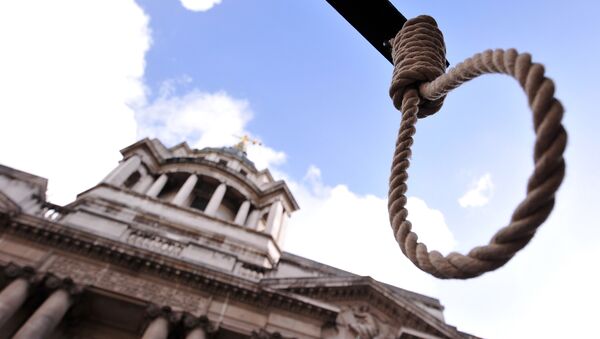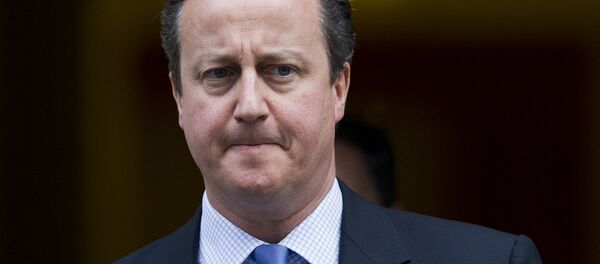The Gulf kingdom is the only major state that still uses the death to be omitted from the UK Foreign Office list, which was given to given to diplomats in 2011 as part of Britain's five-year plan aimed at restricting executions worldwide.
The list includes countries such as the US, China and Iran, while it also features smaller nations like Barbados, Singapore and Jordan that between them sentenced 10 people to death in 2014.
UK Gov campaign against death penalty left Saudi off list of 30 states using it — amid UK push to get Saudi onto UN Human Rights Commission.
— Jon Snow (@jonsnowC4) January 5, 2016
The UK strategy lists a number of "priority countries" where diplomats are "encouraged" to "proactively drive forward" and "make progress" on the British goal of abolishing the death penalty.
Many critics have taken aim at Saudi Arabia's omission from the list, given that the country was accused of carrying out more than 150 executions in 2015, plus another 47 in a mass execution over the weekend.
A list of countries that still allow the #deathpenalty. We're in such great company. #NotMyAmerica pic.twitter.com/6CZYYftVxn via @RCdeWinter
— Kathryn Brusco (@KathrynBruscoBk) December 30, 2015
Saudi Omission 'Shocking'
Campaigners have accused the UK government of deliberately leaving Saudi Arabia off the list to protect the country from British criticism, which could call into question a number of defense and trade deals between London and Riyadh.
Maya Foa, director of the death penalty team at human rights organization Reprieve said the findings were "shocking."
"Saudi Arabia has consistently ranked in the world's top five executioners, and a large proportion of beheadings carried out in the country have been for non-violent offences, including protest. It is shocking that the Kingdom was absent from the countries targeted by the UK's death penalty strategy over the past five years, when every other major executioner in the world — China, Iran, Iraq, the US and Pakistan — was included," Foa said.
Press release: 2016 sees UK drop #deathpenalty strategy as executions spike in Iran, Pakistan & Saudi https://t.co/KQXEvmKDrb
— Reprieve (@Reprieve) January 5, 2016
Allan Hogarth, head of policy at Amnesty International UK said the British government was trying its hardest not to criticize the Saudis over human rights concerns.
"We've become increasingly alarmed that the UK government has been bending over backwards to avoid criticizing Saudi Arabia's appalling human rights record," he said.
"Ministers are always harping on about how their 'engaged' relationship with Riyadh means they can talk 'frankly' on issues like human rights, but what do these conversations actually consist of and what have they ever achieved? Apparently very little. It's time the government reviewed its approach to human rights in the Kingdom and adopted a far more robust stance."
Most people executed 1 China 2 Iran 3 Saudi Arabia 4 Iraq 5 US (2014, @Amnesty) pic.twitter.com/wFE9xDsti1
— Conrad Hackett (@conradhackett) January 3, 2016
Calls for Review of UK-Saudi Relationship
Liberal-Democrat leader Tim Farron has called for an investigation, saying that the government needed to "shine a light" on the "shady corners" of the bilateral relationship between the countries.
Capital punishment is abhorrent. The PM must do more to make the case to foreign govts about ending the practice. https://t.co/exQK7UKSXJ
— Tim Farron (@timfarron) January 2, 2016
"Saudi Arabia is a barbaric regime and the UK government must do more to stand up to them. The Government must not just write reports and accidentally miss them out due to worrying about diplomatic nicety, it should hold them to account.
"The Liberal Democrats have called for a debate into the UK — Saudi Arabia relations to try and shine a light into the shady corners of this relationship."
Former foreign secretary Sir Malcolm Rifkind backed the PM, saying there were "a number of advantages" to the UK's relationship with the Saudis.
"There are a number of circumstances where Saudi Arabia and the West have co-operated effectively on counter-terrorism," he said.
"That has to be by far the single most important priority at this moment in time."
Sir 'who the f…Malcolm Rifkind says Saudi intelligence matters- presumably not the billions of arms sales then?
— Gavin Roberts (@Roberts56Gavin) January 4, 2016



